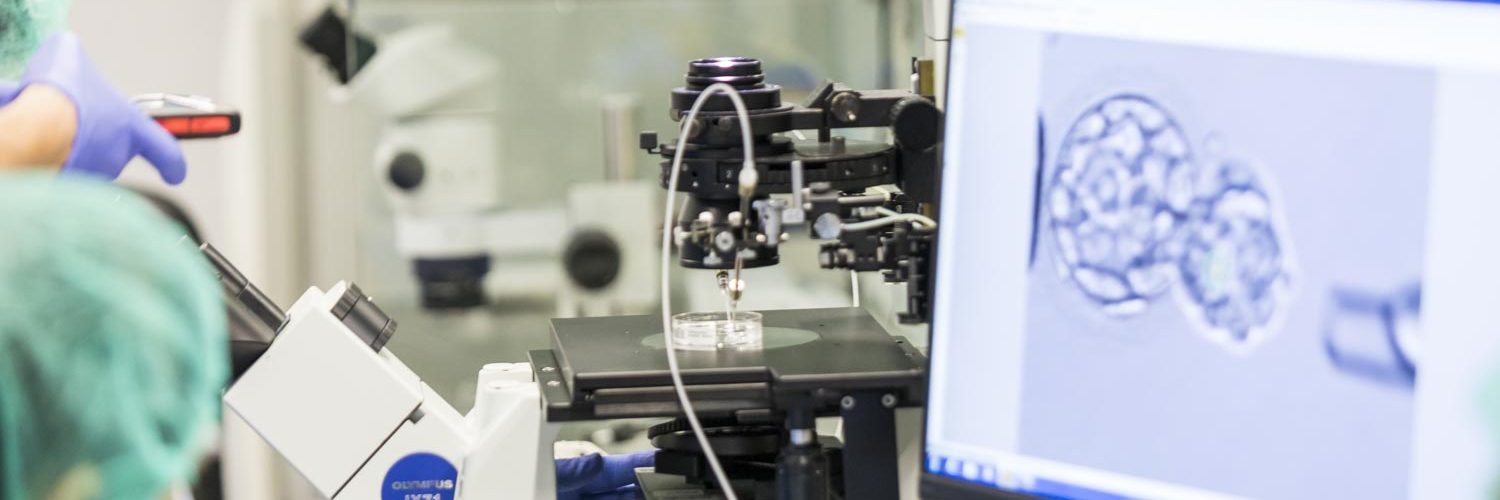
- Embryo and endometrium are two fundamental players in the gestation process. IVI doctors Juan Antonio García Velasco and Elkin Muñoz analyse their influence on recurrent implantation failure and biochemical pregnancy.
VALENCIA, 5 JULY 2022
When implantation failure occurs, the first question to be asked is what caused it. Is it the endometrium or the embryo? This has given rise to much research and the emergence of certain hypotheses regarding the role of the endometrium and the embryo.
At the 38th edition of the Congress of the European Society of Human Reproduction and Embryology (ESHRE), held this year in Milan, Dr. Juan Antonio García Velasco, Scientific Director of IVI, offered a session invited by the Merck Group on the “Myths and realities of endometrial receptivity in Assisted Reproduction”, where he outlines the fundamental lines of analysis to achieve success in reproductive treatments.
“When we talk about ‘recurrent implantation failure’, a concept that has recently been redefined, we know that in most cases it is the embryo that fails. In this sense, it becomes essential to know what embryos are like ‘inside’, to go beyond morphology, beyond what we see under the microscope; to study them in depth. And for this, pre-implantation genetic testing (PGT-A) will help us to confirm whether the embryos are chromosomally normal or not, which is the reason for, not all, but the vast majority of implantation failures”, explained Dr. García Velasco.
Assisted reproduction centres are currently studying many parameters that influence the success of treatments to a greater or lesser extent. Some will be fundamental in order to improve the results of these patients; others perhaps not so.
Something as simple as endometrial thickness shows a clear relationship with reproductive success. If it does not reach 6-7 millimetres, the results will be worse. But is endometrial transcriptomics still as revolutionary as it was originally advertised?
“The many receptivity tests on the market are very interesting tools, but they do not benefit all patients equally. We have a long way to go to understand which patients have the best results with these techniques. The same is true for new fields of study such as endometrial and vaginal microbiota and chronic endometritis; two attractive and promising areas with wide-ranging perspectives. However, we still have to clarify the diagnostic criteria and, in particular, the profile of patients who will benefit from them, as well as confirming that the treatments for the abnormalities found really improve the patients’ prognosis”, added Dr García Velasco.
Science is constantly advancing and outlining new horizons that lead Reproductive Medicine professionals to offer increasingly accurate diagnoses and personalised treatments to ensure their patients’ achieve their wish to become pregnant in the shortest time and with the greatest guarantees. Knowing, choosing and applying the best tools brings them one step closer to the goal every day.
Biochemical pregnancy loss: Embryo or endometrium?
Embryo and endometrium are two fundamental players in the gestation process. In this sense, and although the causes of biochemical pregnancy loss are not known with certainty at present, some factors associated with it could be related to age, poor quality eggs and embryos or altered endometrial receptivity.
“Biochemical pregnancy is a very common situation in natural reproduction, but even more so in assisted reproduction. It occurs when, after an egg is fertilised and the embryo is implanted in the mother’s uterus, the embryonic development process is interrupted after a few days and the pregnancy stops progressing. It occurs more frequently in the field of assisted reproduction due to the fact that we monitor the increase in pregnancy hormone levels in the patients’ blood at an early stage, meaning we detect more biochemical pregnancies than in natural gestation”, said Dr. Elkin Muñoz, Director of IVI Vigo and A Coruña.
This is the starting point of the study “Is biochemical pregnancy loss (BPL) associated with embryo or endometrium? A multicentre retrospective study with +7000 cases”, led by Dr. Muñoz, and presented at the current edition of the ESHRE Congress.
“This is a retrospective study with a sample of more than 7,000 patient cases over 8 years, resulting in an overall biochemical pregnancy rate of 8%. After analysing embryos for chromosomal content or analysing endometrial receptivity, we have seen that this frequency is not reduced. Therefore, it is necessary to learn more about the intrinsic phenomenon that leads to biochemical pregnancy in order to advance in its prevention,” said Dr. Muñoz.
Thus, the 7,000 cases studied are divided into the following 4 groups:
- Patients whose embryos were studied to select the chromosomally normal ones.
- Patients who underwent endometrial receptivity testing.
- Patients who received both chromosomal and endometrial testing
- And finally, patients in the control group who underwent conventional IVF without any additional testing.
“Although the biochemical pregnancy rate is slightly lower in the group with a higher level of testing (PGT-A and ERA), in actual fact, as we mentioned before, the differences are not statistically significant. This leads us to conclude that we must continue to investigate the causes of a still unresolved problem, affecting almost 1 in 10 pregnant women”, concluded Dr. Muñoz.
IVIRMA at the ESHRE Congress
IVIRMA has been committed to constant innovation for more than 3 decades to achieve the dreams of thousands of patients who trust them with their desire to become parents.
As an example of this, at the 38th edition of the ESHRE Congress it will present nearly 50 papers, 2 invited sessions, 7 talks in pre-congress courses and 4 sponsored sessions, with the aim of highlighting IVI’s leadership in research and development, promoting the families of tomorrow through personalised fertility solutions.
